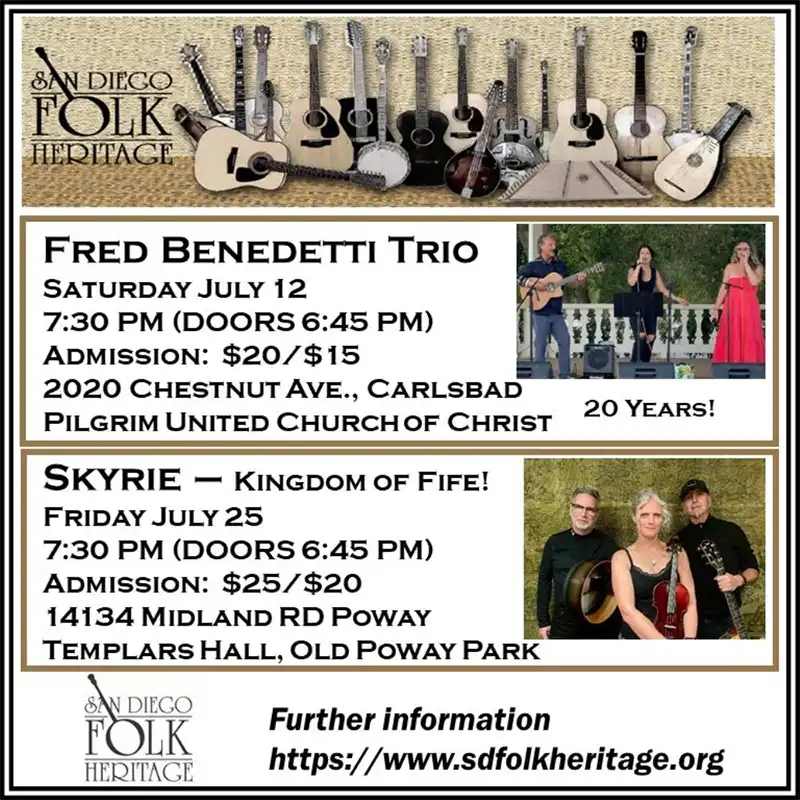Yesterday And Today
Queen of Hillbilly Swing: Rose Maddox
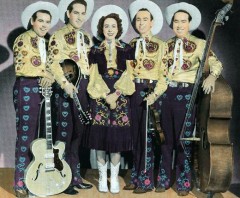
The Maddox Brothers and Rose went on to become one of the most popular and colorful hillbilly bands of their time.
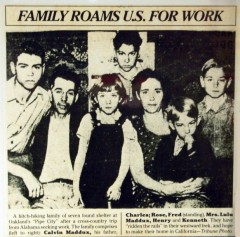
Article from the Oakland Tribune, April 1933, about the Maddox family’s experience travelling from Alabama to California
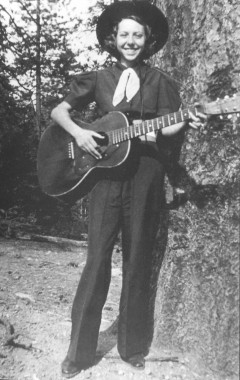
Teenage Rose
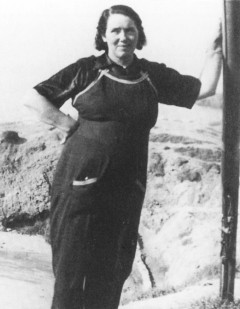
The formidable Lula Maddox
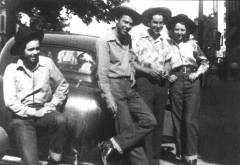
Rose and brothers Cal, Cliff, and Fred, downtown Modesto, late 1930s
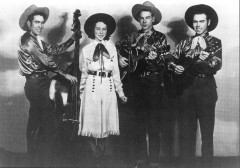
Ready for the big time: Fred, Rose, Cliff, and Cal in an early publicity shot
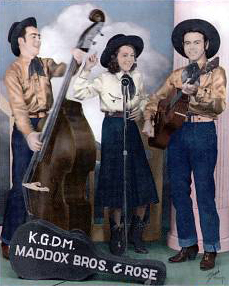
KGDM publicity shot, Stockton, California, 1938
The first time I heard of Rose Maddox was about ’71 or ’72. I was working at an ice cream shop and employees took turns picking radio stations. When my turn rolled around I tuned in to KSON, the only country station in town back then. In those ancient days it was customary to hear classic country and classic artists mixed into the station’s top 30 play format. I don’t exactly remember which Rose Maddox song played, but it hit a musical nerve somewhere in my soul, and I knew she was the real deal.
My parents, being transplanted West Coast honky-tonkers, were very familiar with her music back in the day when she was part of the seminal California hillbilly band, the Maddox Brothers and Rose. They lost track of her a decade or so earlier when the band broke up and Rose ventured out on her own. But as (the Byrds’) Gene Clark once sang, “It’s funny how a circle turns around.” My folks were a bit surprised when I mentioned that old familiar name, but, indeed, great music has a knack of going full circle, touching one generation after another. In her own way, Rose helped to connect the generation gap at the Duplessie residence, if only by a little bit.
Rose was born Roselea Arbana Maddox on August 15, 1925, near Boaz, Alabama, to impoverished sharecroppers, Charlie and Lula Maddox. In 1933 the family followed Lula’s dream, conceived by way of dime store novels, of moving to California. They sold all they had, except for the clothes on their backs and one or two other essential belongings, for $35. With five of their seven kids in tow, the family made their way to the California promised land. An older son, Cliff, and daughter, Alta, stayed behind for the time being and joined the family later on. Like something right out of Steinbeck, they hitched rides from friendly truckers as far as Meridian, Mississippi. From there they rode freight trains heading for the coast. With the help of kindly brakemen, who fed the family with leftovers from the caboose and shielded them from the dreaded railroad bulls along the way, the Maddox family finally arrived in Los Angeles. Rose was seven at the time.
Soon finding their way to Oakland, the Maddox family lived in a makeshift Hooverville community called Pipe City, named for its huge cement storm drain pipes yet to be laid underground, which provided shelter for its residents. The family earned some notoriety when the Oakland Tribune printed a picture of the haggard-looking family with a caption describing their flight, plight, and hope of making a new life for themselves in California. While in Oakland, the family was reduced to seeking handouts and standing in bread lines. But Lula, ever the iron-willed matriarch and family visionary, wasn’t about to give up on her California dreamin’. Seemingly unable to differentiate legend from reality, Lula ordained that the family would pan for California gold. Catching a north-bound freight for Toulumne, the Maddoxes were in the foothills of the Sierra Nevada. With no gold in them thar hills, the family reached the end of the line.
California was turning out to be as mean as everywhere else the family had rambled. In desperation Lula and Charlie decided to give Rose up for adoption. Rose had become fast friends with the Toulumne postmaster’s little daughter. This was a time when children were commonly “adopted” by outsiders for their “betterment” with no more than a simple handshake. Rose lived with the postmaster’s family for about a month. So homesick for her family and stung by what seemed to be the cruelest rejection, she simply erupted. In a 1997 interview, Rose shared the following about this bitter experience.
They gave me to a postmaster to be a companion to his little girl. She was my friend until then. I hated it. All I wanted to do was get back to my family. I was seven. I was a bitch. I was a mean little kid.
Her strategy worked, and Rose was quickly “unadopted” and back with her parents and siblings.
While living in Toulumne, Charlie and brother Cal finally landed steady work in Modesto picking fruit. Lula and the rest of her scruffy brood soon joined them and the family found themselves living the gypsy lifestyle of itinerant “fruit tramps,” following the crop cycles up and down the San Joaquin Valley and as far south as the Imperial Valley and Yuma.
Despite living in the filth and squalor of migrant camps, the family no longer had to worry about where the next meal would come from. Charlie and Lula were even able to squirrel away enough money to buy a second-hand Model A Ford. There would be no more hopping freights for the Maddox family! One day, while the family was working out in a Chowchilla cotton field, brother Fred announced a new, get-rich-quick plan. Fred, though only 18 at the time, was a silver-tongued hustler with the soul of a carnival barker. He had recently seen a band play a rodeo in Modesto. Finding out that the band was getting paid the unimaginable sum of $100, he was all but ready to assume this new line of work. To Fred it didn’t matter that only brothers Cal and Cliff had any idea about how to play guitar. It looked fun and could be lucrative, even at mid-’30s depression rates. The family had taken more than their fair share of chances, had come close to starving and freezing to death, risked the perils of riding the rails, and tried every other angle of work, from panhandling to migrant labor. What did they have to lose?
Once back in Modesto, Fred quickly secured a gig for the newly conceived family band, a 6:30-7:30 morning radio slot on station KTRB. As the story goes, he went into Rice’s Furniture Store looking for a prospective sponsor. The owner, Jim Rice, was willing to give the band a chance, but only if they had a girl singer and if Fred did all the ads. Fast-talking Fred assured him that they had the best girl singer around, while withholding the fact that this girl singer was none other than 11-year-old sister Rose, whose only prior singing experience had been garnered around migrant camp fires and singing along with Roy Rogers and the Sons of the Pioneers at Saturday afternoon matinees. Not one to quit while ahead, Fred made a deal to purchase a new bass fiddle from Mr. Rice at $10 down and $10 a month that very same morning. Apparently it didn’t seem odd to Mr. Rice that at least one of the band members didn’t own his own instrument. Thus was birthed the Maddox Brothers and Rose that same day, with Fred on bass fiddle, brother Cal on guitar and harmonica, and girl singer Rose. Occasionally brother Cliff would join the family combo on guitar.
Inexplicably, these novices proved to be an immediate hit. Their reputation grew, and a lot of furniture was sold, too. Needless to say, Jim Rice was very pleased. A morning show would include songs by Elton Britt, Patsy Montana, Sons of the Pioneers, and traditional folk and gospel songs. The band was getting plenty of exposure — but more important, they were gaining valuable experience as live performers and musicians and began to create a unique style all their own.
Since Jim Rice didn’t have to pay them a cent, none of them quit their jobs as fruit pickers and Rose remained in school, at least for the time being. They did find a way to make money with their music nonetheless. With Lula in firm control they commenced to follow the rodeos, fairs, and frontier day celebrations from Bakersfield to Susanville. Lula would finagle a barkeep into letting the band play for tips. Their music and performance were always well received, and they would return home with much more than what they left with. Rose recalled eating a whole lot better as a result. Often they drove all night with brother Cal at the wheel in order to make it back to Modesto in time for their morning radio show.
By 1938 the Maddox Brothers and Rose were netting some modest regional success but beginning to carry themselves as the hottest hillbilly band in the state. They certainly dressed the part anyway. Lula made sure that the family’s entire earnings, from both the playing and non-playing members alike, were pooled for the benefit of the band. Their flashy cowboy outfits, automobile upkeep, and instruments were paid for by the labor of all the family members. It was Fred who got the band going, but it was Lula, again, who was the grand visionary. She wanted the band to be more than just a way to supplement their wages as fruit tramps. She saw music as a vehicle for escaping a life of poverty and one that could take the family to the heights of fame and fortune. All they needed was to stick together and galvanize their resources toward that goal.
Soon the band was doing broadcasts on other radio stations with the affable hayseed, Fred, always putting in a plug for upcoming live shows. Besides all the free publicity that the radio provided, the band also gained access to station music vaults.
They could continually add new songs and styles to their repertoire as a result. Though they learned to play a wide range of styles, the one that became their trademark was their brand of hillbilly boogie. Eight-beats-to-the-bar boogie lent itself perfectly to their playing aptitude, with the band getting behind Fred’s slapping bass. The foundation of rockabilly was being laid via their style, interpretation, and delivery. It was fun to play and fun for the audience to listen and dance to. Whenever the Maddox Brothers and Rose showed up in town, a memorable event was to be had. The band members soon became experts at improvisation, replete with bawdy comedy, risque read-between-the-lines phrases, and outright suggestive songs like “Sally, Let Your Bangs Hang Low.” All this added to the fun factor of a Maddox Brothers and Rose show.
Despite their hell raising and lusty song interpretations, all carnal appetites were checked by the ever-watchful eye of mama Lula. Lula kept a particularly close eye on Rose, quick to shoo away potential suitors. This may have been appropriate while Rose was in her teens, but Lula remained the overbearing custodian of Rose well into adulthood.
In 1939 the band was ready for the big time. Having been alerted by a fan to a hillbilly band competition at the Sacramento State Fair, their performance of “Sally, Let Your Bangs Hang Low” blew out the other 14 entrants to officially make the Maddox Brothers and Rose California’s best hillbilly band. As first-place winners, the band won a one-year contract on Sacramento radio station KFBK, one of the many stations owned by the McClatchy Broadcast Network throughout the West. Soon the Maddox Brothers and Rose could be heard over KFWB in Hollywood as well as stations in Oregon, Washington, Nevada, and Arizona. The band now had access to a huge Western audience.
Lula and the band secured new digs in Sacramento, while Charlie, sister Alta, Cliff, and his wife, Gordie stayed in Modesto. Lula decided that the band’s sound needed further augmenting, so a very reluctant brother Don was drafted as its new fiddle player. A self-taught stumbler in the beginning, Don often kept his back to the audience to hide his embarrassment, but he would become a signature player in the years ahead. On occasion, Cliff would join on guitar, but he was a good picker who could find work with other hillbilly outfits and preferred to distance himself from his domineering mother. Rose took up bass around this time, which freed up brother Fred for more vocal duties.
By 1941 and the start of World War II, the Maddox Brothers and Rose were an established, accomplished, and very popular band. Music had allowed the entire family to escape the grinding poverty of their recent past. But with the attack on Pearl Harbor, things came to an abrupt halt. Fred and Cal found themselves in the army. Don would follow shortly afterward. It was the war and the absence of her brothers’ support that would force Rose to mature as a star in her own right.
This 3-part series, written by the late Lyle Duplessie, co-founder of the San Diego Troubadour, continues next month, in the February issue, covering Rose Maddox’s life from the war years through the 1960s.


